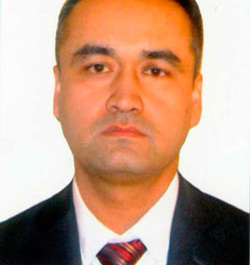China: UNHCR refuses to shed light
| Publisher | Radio Free Asia |
| Publication Date | 6 June 2011 |
| Cite as | Radio Free Asia, China: UNHCR refuses to shed light, 6 June 2011, available at: https://www.refworld.org/docid/4e0c3b2327.html [accessed 19 May 2023] |
| Disclaimer | This is not a UNHCR publication. UNHCR is not responsible for, nor does it necessarily endorse, its content. Any views expressed are solely those of the author or publisher and do not necessarily reflect those of UNHCR, the United Nations or its Member States. |
2011-06-06
The refugee agency says it cannot provide details of a Uyghur teacher's plight.
The U.N. office for protecting refugees confirmed Monday that it has withdrawn the refugee status of a Uyghur schoolteacher who was deported last week by Kazakhstan to China, where he could be punished for exposing torture and death in Chinese prisons.
The office of the U.N. High Commissioner for Refugees (UNHCR) withdrew the refugee status provided to Ershidin Israil "in light of new information that has become available," Babar Baloch, spokesman for the Geneva-based agency said in an e-mail reply to RFA.
"He is not eligible for international refugee protection," Baloch said, refusing to provide the basis for UNHCR's decision.
"Due to UNHCR's policy of confidentiality, we are not in a position to disclose further information on the individual case," he said.
Having lost his refugee status and been refused political asylum by a Kazakhstan court, Israil, 38, was deported to China's Xinjiang Uyghur Autonomous Region amid an outcry by human rights groups, which fear he could be tortured by Chinese authorities, who have accused him of "terrorism."
'Irresponsible behaviour'
"This is a shocking disclosure and irresponsible behaviour on the part of UNHCR," T. Kumar, Amnesty International's director for international advocacy in Washington, said in an interview.
"Instead of protecting refugees, it is looking like the agency is being complicit in abuses inflicted on refugees forcibly expelled to their home countries where they could be tortured," he said.
Kumar said Amnesty has documented cases of political prisoners being tortured and even executed after their expulsion to the Xinjiang region.
It is the only region in China where political prisoners can be executed, he said.
Kumar has asked the UNHCR to provide the basis for its decision to withdraw Israil's refugee status, saying it should not "hide behind its policy of confidentiality."
"The circumstances in which his refugee status was withdrawn are critical in this case."
Fled on foot
 Ershidin Israil in an undated photo provided by a friend.
Ershidin Israil in an undated photo provided by a friend.
Israil had sought sanctuary in Kazakhstan after fleeing on foot across the border to its largest city, Almaty, from the Xinjiang region.
In Xinjiang, he had exposed to Radio Free Asia the death in custody of a fellow Uyghur held by Chinese authorities for alleged involvement in July 2009 riots in the regional capital Urumqi.
Shohret Tursun was beaten to death in September 2009 while in detention.
Tursun's badly bruised and disfigured body was released to his relatives nearly two months later, prompting a standoff between authorities who wanted him buried immediately and family members who refused and demanded an inquiry into whether he had been beaten to death.
The family was forced to hold a burial for Tursun the following day.
Relenting to China's demands?
The Germany-based World Uyghur Congress (WUC) has accused the UNHCR office of effectively relenting to China's demands.
"We know that China had its hand in the case. We were not surprised by Kazakhstan's decision ... but we were surprised that UNHCR officials in Almaty and Geneva believed China's allegations and followed China's orders in Ershidin [Israil]'s case," WUC secretary Dolkun Isa had said.
"The UNHCR also violated international law by not taking any action while the deportation was taking place. Kazakhstan should not have returned Ershidin to China whether or not he was recognized as a refugee, because the Convention Against Torture applies whether or not the person is a bona fide refugee," he said
The United Nations Convention Against Torture "forbids states to return people to their home country if there is reason to believe they will be tortured."
Whereabouts
UNHCR's Baloch declined to provide details of Israil's whereabouts.
"Also, we are not in a position to provide any information on the individual's whereabouts. UNHCR does not have a mandate for persons for whom it has been determined that they are not refugees," he said.
Kazakhstan and China are member states of the regional Shanghai Cooperation Organization (SCO).
Based on SCO agreements, Kazakhstan is obliged to extradite individuals accused by another member state government of "terrorism," "separatism," or "extremism."
It may also have to "prevent the granting of refugee status and corresponding documents" to persons alleged to be involved in offenses related to "terrorism."
Reported by Parameswaran Ponnudurai
Link to original story on RFA website
